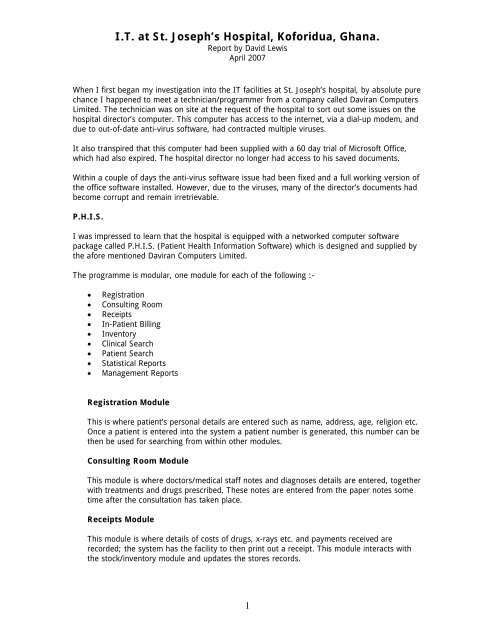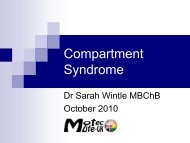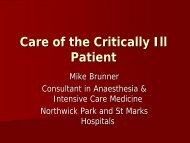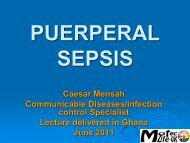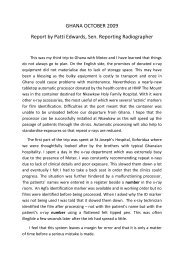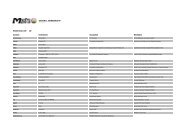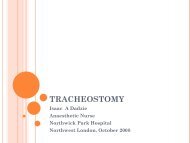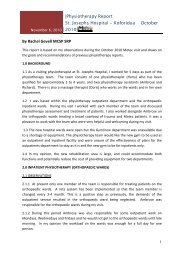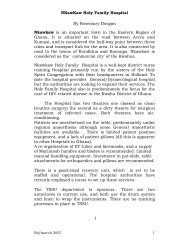I.T. at St. Joseph's Hospital, Koforidua, Ghana. - MOTEC LIFE-UK
I.T. at St. Joseph's Hospital, Koforidua, Ghana. - MOTEC LIFE-UK
I.T. at St. Joseph's Hospital, Koforidua, Ghana. - MOTEC LIFE-UK
Create successful ePaper yourself
Turn your PDF publications into a flip-book with our unique Google optimized e-Paper software.
I.T. <strong>at</strong> <strong>St</strong>. Joseph’s <strong>Hospital</strong>, <strong>Koforidua</strong>, <strong>Ghana</strong>.<br />
Report by David Lewis<br />
April 2007<br />
When I first began my investig<strong>at</strong>ion into the IT facilities <strong>at</strong> <strong>St</strong>. Joseph’s hospital, by absolute pure<br />
chance I happened to meet a technician/programmer from a company called Daviran Computers<br />
Limited. The technician was on site <strong>at</strong> the request of the hospital to sort out some issues on the<br />
hospital director’s computer. This computer has access to the internet, via a dial-up modem, and<br />
due to out-of-d<strong>at</strong>e anti-virus software, had contracted multiple viruses.<br />
It also transpired th<strong>at</strong> this computer had been supplied with a 60 day trial of Microsoft Office,<br />
which had also expired. The hospital director no longer had access to his saved documents.<br />
Within a couple of days the anti-virus software issue had been fixed and a full working version of<br />
the office software installed. However, due to the viruses, many of the director’s documents had<br />
become corrupt and remain irretrievable.<br />
P.H.I.S.<br />
I was impressed to learn th<strong>at</strong> the hospital is equipped with a networked computer software<br />
package called P.H.I.S. (P<strong>at</strong>ient Health Inform<strong>at</strong>ion Software) which is designed and supplied by<br />
the afore mentioned Daviran Computers Limited.<br />
The programme is modular, one module for each of the following :-<br />
• Registr<strong>at</strong>ion<br />
• Consulting Room<br />
• Receipts<br />
• In-P<strong>at</strong>ient Billing<br />
• Inventory<br />
• Clinical Search<br />
• P<strong>at</strong>ient Search<br />
• <strong>St</strong><strong>at</strong>istical Reports<br />
• Management Reports<br />
Registr<strong>at</strong>ion Module<br />
This is where p<strong>at</strong>ient’s personal details are entered such as name, address, age, religion etc.<br />
Once a p<strong>at</strong>ient is entered into the system a p<strong>at</strong>ient number is gener<strong>at</strong>ed, this number can be<br />
then be used for searching from within other modules.<br />
Consulting Room Module<br />
This module is where doctors/medical staff notes and diagnoses details are entered, together<br />
with tre<strong>at</strong>ments and drugs prescribed. These notes are entered from the paper notes some<br />
time after the consult<strong>at</strong>ion has taken place.<br />
Receipts Module<br />
This module is where details of costs of drugs, x-rays etc. and payments received are<br />
recorded; the system has the facility to then print out a receipt. This module interacts with<br />
the stock/inventory module and upd<strong>at</strong>es the stores records.<br />
1
I.T. <strong>at</strong> <strong>St</strong>. Joseph’s <strong>Hospital</strong>, <strong>Koforidua</strong>, <strong>Ghana</strong>.<br />
Report by David Lewis<br />
April 2007<br />
In-P<strong>at</strong>ient Billing Module<br />
This module, surprisingly, is not currently used but it is for the recording of stock/costs used<br />
for p<strong>at</strong>ients th<strong>at</strong> are admitted to the wards. The module can also produce printed receipts<br />
and it too interacts with the stock/inventory module.<br />
Inventory Module<br />
This module is basically a stock control module and is capable of supporting stock items for<br />
up to 20 departments. The stock is managed by the system in such a way th<strong>at</strong> any out-ofd<strong>at</strong>e<br />
products/drugs cannot be used. Out-of-d<strong>at</strong>e products are effectively removed from the<br />
available stock list. <strong>St</strong>ock items th<strong>at</strong> are used/sold, within the receipt module, and the inp<strong>at</strong>ient<br />
module (if it were to be used), is reflected in the inventory module. The pharmacy<br />
department is responsible for inputting/upd<strong>at</strong>ing the stock d<strong>at</strong>a.<br />
Clinical Search Module<br />
A search can be made using clinical d<strong>at</strong>a as the search criteria to recall a p<strong>at</strong>ient’s<br />
details/records, or, groups of p<strong>at</strong>ients having similar tre<strong>at</strong>ments can be recalled.<br />
P<strong>at</strong>ient Search Module<br />
If an existing p<strong>at</strong>ient fails to bring his/her notes or p<strong>at</strong>ient number with them, their records<br />
can be searched for using any personal details as search criteria.<br />
<strong>St</strong><strong>at</strong>istical Reports Module<br />
This module can produce government driven st<strong>at</strong>istics as well as customized st<strong>at</strong>istics for the<br />
hospital’s benefit. Reports are designed and built by the software company.<br />
Management Reports Module<br />
This module can produce all manner of reports useful to the hospital management/admin<br />
department. Reports are designed and built by the software company who can build any<br />
report required on request. Because the software has been sold to many other hospitals,<br />
whenever a new report is built or upd<strong>at</strong>e is made, this is rolled out to all the existing<br />
customers of the software.<br />
Out P<strong>at</strong>ients Department<br />
The OPD has the following areas with computers with access to P.H.I.S. :-<br />
• OPD Cards/Records Room<br />
• Dispensary<br />
• Voluntary Counseling and Testing (VCT)<br />
• Health Insurance<br />
In the Dispensary there is a separ<strong>at</strong>e computer, which acts as the server for the P.H.I.S. system.<br />
Technical bit - The hard drive of this computer has been partitioned and a back-up of the<br />
d<strong>at</strong>abase is saved onto the partition. If this computer/server were to suffer a hard drive failure,<br />
not only could the d<strong>at</strong>abase inform<strong>at</strong>ion be lost but the back-up would suffer the same f<strong>at</strong>e as<br />
2
I.T. <strong>at</strong> <strong>St</strong>. Joseph’s <strong>Hospital</strong>, <strong>Koforidua</strong>, <strong>Ghana</strong>.<br />
Report by David Lewis<br />
April 2007<br />
they are effectively the same hard drive. The d<strong>at</strong>a is however, also backed up to another<br />
separ<strong>at</strong>e computer loc<strong>at</strong>ed in an unused room on the first floor of the administr<strong>at</strong>ion department.<br />
Labor<strong>at</strong>ory<br />
An ancient computer exists within the labor<strong>at</strong>ory which I was informed was broken. It transpired<br />
th<strong>at</strong> it requires a password, which the staff does not know, in order to sign in, so it is therefore<br />
never used, i.e. broken! This computer requires replacing and networking. It must surely be<br />
beneficial for labor<strong>at</strong>ory results to be recorded on p<strong>at</strong>ient’s records.<br />
Administr<strong>at</strong>ion Department<br />
The administr<strong>at</strong>ion department has three computers th<strong>at</strong> have access to P.H.I.S. loc<strong>at</strong>ed in :-<br />
• Admissions Department/Reception<br />
• Personnel/Admin office<br />
• <strong>Hospital</strong> Director’s office<br />
There is a further computer loc<strong>at</strong>ed in the General Accounts office however, this is not, as yet,<br />
networked and therefore does not have access to P.H.I.S.<br />
Internet Access and Anti-Virus upd<strong>at</strong>es<br />
Within the hospital, only the hospital director’s computer has access to the internet and, because<br />
this terminal had acquired multiple viruses, when I first arrived, the ability for the computer to<br />
access P.H.I.S. had been blocked by the system (this is a security fe<strong>at</strong>ure/firewall built into<br />
P.H.I.S. to protect the d<strong>at</strong>abase). This issue is now resolved…until the next time! It should be<br />
bourn in mind th<strong>at</strong> viruses can, and do, spread throughout whole networks of computers from a<br />
single infected machine, which would most likely lead to other computers having P.H.I.S. access<br />
denied. Why this hadn’t already happened, unless unknown to me it had already happened, is<br />
not yet clear.<br />
In order to keep the anti virus software upd<strong>at</strong>ed it will require connection to the internet on a<br />
regular/daily basis. As there is only dial up access this will prove extremely problem<strong>at</strong>ical. It has<br />
also to be established where precisely, the anti-virus software is installed. Ideally it would be on<br />
the server where it can provide protection to the whole network and the server would have an<br />
internet connection. If it is a separ<strong>at</strong>e anti-virus install<strong>at</strong>ion, for each computer, then there will be<br />
a huge problem keeping all the machines upd<strong>at</strong>ed.<br />
I was informed by the hospital administr<strong>at</strong>ion manager th<strong>at</strong> Daviran upload upd<strong>at</strong>ed virus<br />
definitions via a disc, which they manually bring along to the hospital, approxim<strong>at</strong>ely every three<br />
months. This suggests to me th<strong>at</strong> the software is probably server based, but is only a suggestion.<br />
Whichever it is, it is nowhere near good enough. Viruses are released on a daily basis and if the<br />
protection is not kept current the next time the computer goes out on the internet it will get<br />
infected…again…and again, and the whole network once more, becomes <strong>at</strong> risk.<br />
In theory, if the only computer with internet access is kept up-to-d<strong>at</strong>e then no infections will be<br />
allowed onto the network. In reality, it only takes one infected floppy disc or any other plug in<br />
device to be innocently brought in from outside by a member of staff, for a virus to sneak onto<br />
the network via a computer with out-of-d<strong>at</strong>e protection.<br />
3
I.T. <strong>at</strong> <strong>St</strong>. Joseph’s <strong>Hospital</strong>, <strong>Koforidua</strong>, <strong>Ghana</strong>.<br />
Report by David Lewis<br />
April 2007<br />
Daviran Computers Limited<br />
Unfortun<strong>at</strong>ely, the technician had left the hospital before I was able to g<strong>at</strong>her all the inform<strong>at</strong>ion<br />
I required and I have so-far been unable to contact him on the telephone numbers printed on his<br />
business card - which I tried several times while I was in <strong>Ghana</strong> - or the e-mail address, which<br />
returns ‘mailbox unavailable’. Not too reassuring. I will nevertheless continue to <strong>at</strong>tempt to track<br />
him down with the help of the hospital administr<strong>at</strong>ion manager and, enquiries are currently in<br />
hand.<br />
RECOMMENDATIONS<br />
1. A purpose built server to be purchased with multiple hard drives, where protection such<br />
as Anti-Virus, Anti-Spyware, Worm Checker, Firewall etc. can be installed and, correct<br />
back-up procedures maintained. (This is also the recommend<strong>at</strong>ion from Daviran<br />
Computers Limited.)<br />
2. Broadband internet connection <strong>at</strong> the hospital is essential as this would gre<strong>at</strong>ly assist in<br />
protecting the network to the best possible level, as software upd<strong>at</strong>es will be installed<br />
autom<strong>at</strong>ically. (Research will be undertaken to find the best service provider once the<br />
decision is approved)<br />
3. Install a suitable encrypted wireless router to allow internet access to visitors who use<br />
wireless enabled laptop computers, especially useful when Motec provides educ<strong>at</strong>ional<br />
sessions.<br />
4. Networked computers to be installed in the consulting rooms in OPD. This would give<br />
medical staff access to p<strong>at</strong>ient records during consult<strong>at</strong>ion sessions. The ability for<br />
records to be upd<strong>at</strong>ed ‘on-the fly’ r<strong>at</strong>her than waiting for them to be input <strong>at</strong> a l<strong>at</strong>er<br />
stage would also be possible. A networked computer in the labor<strong>at</strong>ory and another<br />
somewhere within the oper<strong>at</strong>ing the<strong>at</strong>re would be also beneficial.<br />
5. Basic I.T. safety/best practices awareness training session’s for all relevant hospital staff.<br />
6. Eventually, the cre<strong>at</strong>ion of an intranet site for the hospital where advice and training can<br />
be shared and accessed easily and, the ability for staff to have their own work email<br />
accounts.<br />
CONCLUSION<br />
The level of I.T. <strong>at</strong> <strong>St</strong>. Joseph’s <strong>Hospital</strong> was far better than I was expecting to find. The P.H.I.S.<br />
software seems to be a very good hospital/p<strong>at</strong>ient management tool, although it is not being<br />
used to its full potential. With the addition of a few more computers, the upgrading of some of<br />
the existing ones and the implement<strong>at</strong>ion of Motec’s recommend<strong>at</strong>ions, I feel th<strong>at</strong> <strong>St</strong>.Joseph’s will<br />
have an I.T. infrastructure for other hospitals in the region to aspire to.<br />
4
I.T. <strong>at</strong> <strong>St</strong>. Joseph’s <strong>Hospital</strong>, <strong>Koforidua</strong>, <strong>Ghana</strong>.<br />
Report by David Lewis<br />
April 2007<br />
Special note/warning to Motec members visiting <strong>St</strong>. Joseph’s<br />
During my visit in April I was accommod<strong>at</strong>ed in a house (the one closest to the hospital, there<br />
are about three) within the grounds of the hospital/monastery. There is a PC in this house.<br />
Beware!! it has a virus/viruses, so be careful if you have a memory stick you wish to use, like I<br />
did. Possibly due to once being borrowed by the Out P<strong>at</strong>ients Department when one of their<br />
computers was faulty, it became infected. Luckily for me the anti-virus software in the hospital<br />
had just been upd<strong>at</strong>ed (you may not be so fortun<strong>at</strong>e) so when the infected memory card was<br />
plugged into a computer in the admin block, in order to print out a document, the virus was<br />
captured and deleted off the device.<br />
The virus had also infected my digital camera’s memory cards, as I was viewing my daily photoshoot<br />
on the computer by connecting the camera via a USB cable. The viruses were however,<br />
cleaned up by my own computer’s anti-virus software on my return home. On my next visit I<br />
intend to take some utilities with me th<strong>at</strong> I can use to clean up the computer and make it safe.<br />
Needless to say, this computer has no internet access, so <strong>at</strong> least it shouldn’t contract any further<br />
viruses, unless someone brings another one in on a memory stick!! (which of course, is another<br />
possible explan<strong>at</strong>ion why it got infected in the first place)<br />
5


